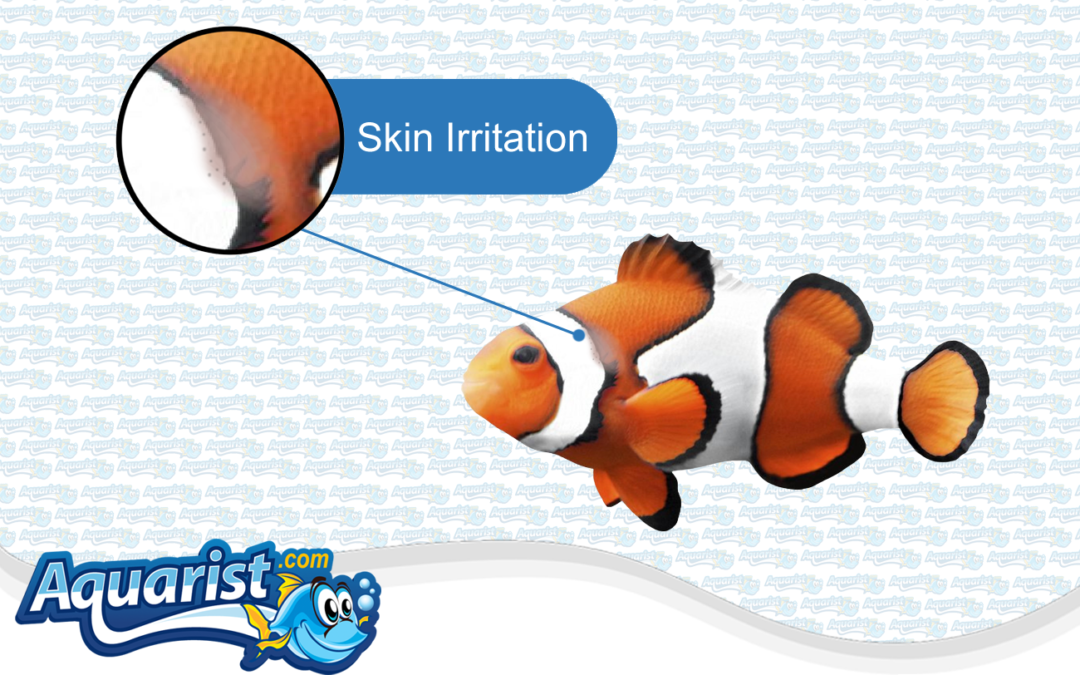Comprehensive Guide to Saltwater Fish Diseases: Skin Irritation
Skin irritation in saltwater fish is a common issue that can result from a variety of causes, including environmental stressors, infections, and parasites. This condition manifests as itching, inflammation, redness, or excess mucus production, often causing discomfort for the affected fish. If left untreated, skin irritation can lead to secondary infections and other health problems. This guide provides a detailed overview of skin irritation in saltwater fish, covering its causes, symptoms, treatment options, and preventive measures.
What is Skin Irritation in Fish?
Skin irritation in fish refers to any condition that causes the skin to become inflamed, itchy, or otherwise uncomfortable. This can be due to direct physical irritation, underlying infections, or environmental issues. Fish experiencing skin irritation may exhibit abnormal behaviors such as rubbing against tank decorations, scratching, or flashing, which are attempts to alleviate the discomfort.
Causes of Skin Irritation
Skin irritation in saltwater fish can be caused by several factors, including:
- Parasites: External parasites such as marine ich (Cryptocaryon irritans), flukes, and copepods can attach to the skin and cause irritation.
- Bacterial or fungal infections: Infections can lead to skin inflammation, sores, and excess mucus production, causing discomfort.
- Poor water quality: High levels of ammonia, nitrite, or nitrate can irritate fish skin and gills, leading to redness or increased mucus production.
- Physical trauma: Injuries from aggressive tank mates, sharp decorations, or rough handling can cause skin irritation and damage.
- Chemical irritants: Chemical residues from medications, cleaning agents, or contaminants can irritate fish skin.
Symptoms of Skin Irritation
Identifying the symptoms of skin irritation early can help prevent more severe health problems. Common signs include:
- Scratching or rubbing: Fish may scratch against rocks, sand, or other tank decorations in an attempt to relieve itching.
- Redness or inflammation: The skin may appear red, swollen, or irritated in certain areas.
- Excess mucus production: Fish may produce more mucus, often visible as a slimy coating on the skin.
- Flashing: Flashing refers to rapid, darting movements or flipping to one side as the fish tries to scratch itself.
- Lesions or sores: Prolonged irritation may lead to open sores, ulcers, or wounds on the skin.
Treatment Options for Skin Irritation
Treating skin irritation in saltwater fish involves addressing the underlying cause and providing supportive care to alleviate symptoms. Follow these steps to manage the condition effectively:
- Improve water quality: Perform regular water changes to reduce levels of ammonia, nitrite, and nitrate. Test the water frequently to ensure parameters are within acceptable ranges.
- Treat for parasites if present: If parasites are the suspected cause, use appropriate antiparasitic treatments such as copper-based medications, praziquantel, or freshwater dips.
- Use antibacterial or antifungal treatments: If a bacterial or fungal infection is present, treat the fish with suitable medications such as antibiotics or antifungal agents.
- Add aquarium salt: Slightly increasing the salinity (if the fish can tolerate it) can help reduce stress and support healing. Ensure that the species in your tank can handle changes in salinity.
- Provide a stress-free environment: Minimize stress by reducing aggressive interactions, providing hiding places, and maintaining a stable tank environment.
- Quarantine affected fish: If possible, move the affected fish to a quarantine tank to monitor their condition and prevent the spread of infection.
Preventing Skin Irritation
Prevention is key to keeping your fish healthy and free from skin irritation. Here are some steps to help reduce the risk of skin problems in your saltwater aquarium:
- Maintain optimal water quality: Regularly test and monitor water parameters, including pH, ammonia, nitrite, and nitrate levels. Perform routine water changes and clean the tank to maintain a healthy environment.
- Quarantine new fish: Always quarantine new fish for at least 2-4 weeks before introducing them to the main tank to prevent introducing parasites or infections.
- Feed a balanced diet: Provide a varied diet that includes high-quality foods to boost the immune system and promote overall health.
- Use compatible tank mates: Avoid keeping aggressive species together to reduce the risk of injuries and stress-related skin problems.
- Be cautious with medications and chemicals: Follow instructions carefully when using medications or chemicals in the tank, and avoid overuse to prevent chemical irritation.
Pro Tips for Treating and Preventing Skin Irritation
- Act quickly: Early intervention can prevent minor skin irritation from developing into more serious infections.
- Monitor water quality closely: Regularly check water parameters, especially during treatment, to ensure optimal conditions for recovery.
- Use natural healing aids: Products like Melafix or Stress Coat can help promote healing and reduce inflammation by supporting the skin's natural barrier.
- Disinfect equipment: After treating infected fish, clean and disinfect any equipment used to prevent the spread of pathogens.
Common Mistakes to Avoid When Treating Skin Irritation
To ensure effective treatment and avoid complications, be aware of these common mistakes:
- Neglecting water quality: Poor water quality is a major contributor to skin problems. Always address water conditions when treating skin irritation.
- Overusing medications: Avoid using multiple treatments at once without guidance, as this can stress the fish and impact water quality.
- Failing to identify the cause: Without determining the underlying cause of skin irritation, treatment may be ineffective, and the problem could recur.
- Not quarantining new arrivals: Introducing new fish without quarantine can bring parasites and diseases into the main tank, leading to outbreaks.
Understanding the Impact of Skin Irritation on Fish Health
Skin irritation can significantly impact the health and well-being of saltwater fish. Persistent itching and inflammation can lead to secondary infections, stress, and reduced immune function. If left untreated, minor skin issues can develop into severe health problems. Proper diagnosis, timely treatment, and preventive measures are essential for maintaining a healthy aquarium and ensuring the long-term health of your fish.
Conclusion
Skin irritation in saltwater fish can be caused by a variety of factors, including parasites, infections, poor water quality, and physical injuries. Recognizing the symptoms and addressing the underlying causes are crucial for effective treatment and prevention. By maintaining optimal water quality, quarantining new arrivals, and providing a stress-free environment, you can help protect your fish from skin problems. With proper care and timely intervention, you can ensure the health and well-being of your saltwater fish.

